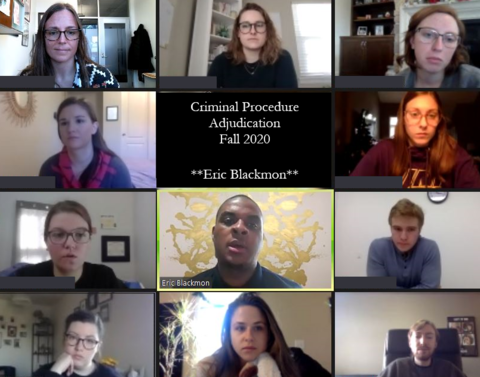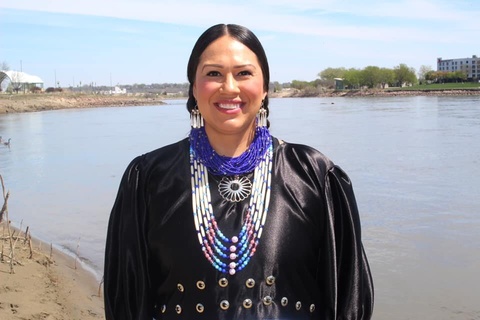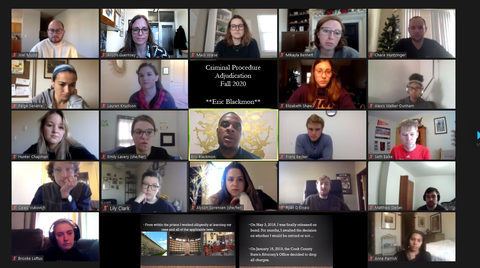
Are you teaching an undergraduate or graduate course that features work by an expert outside the University of Iowa? Do you have a colleague from another institution who could bring a thought-provoking cross-disciplinary perspective to an issue you’re addressing in your course? If you would like to invite a practitioner or expert from the public sector to speak in a course you are teaching this spring semester, we are offering a $150 honorarium to support virtual course visits. View application information.
The inaugural round of Invite-a-Guest-to-Class mini-grants in Fall 2020 supported visits by seven educators, researchers, and activists. The faculty recipients assigned readings to their students in advance to help them prepare for the guests' visits, and reported on the visits afterward. Many of these visitors shared perspectives far afield from the UI campus. As we look for "silver linings" to teaching during COVID, it seems that this creative way of highlighting and amplifying new voices is one of the better ones. Here are a few experiences reported by Fall 2020 recipients:

Richard Velasco (Teaching & Learning, College of Education) invited Chris Luzniak, a math teacher and department chair at the Archer School for Girls in Los Angeles.
In October, Luzniak (right) met with Velasco's mathematics education class to explore the topic of facilitating meaningful mathematical discourse. "Mr. Luzniak is very skilled in the art of integrating discourse and implementing debates in mathematical classrooms," wrote Velasco. "He has presented and given workshops in various national math education conferences across the nation, including the annual meeting of the National Council of Teachers of Mathematics. Chris has worked to develop debate routines that bring student voice and discussion into the math classroom. He coaches teachers in both math and science to develop real-world debate activities for students. [...] I've had the experience of participating in one of Mr. Luzniak’s workshops, and it is one that I’m hoping every current and future math teacher could experience one day."
One student reflected on the visit: “One of my key takeaways is that involving debates in the classroom increases students’ productive engagement. I found this insightful because educators can use debate as a way to increase student discourse. This makes mathematics classrooms more student-centered (students can’t help discussing their opinions!), full of critical thinking/arguments/proofs (students can’t help explaining why their opinion is the best), and full of active listeners (students can’t help connecting how others’ opinions support or change their opinion).”

Mary Mayo (Theatre Arts) hosted professor, actor, and director Timothy Douglas from Emerson College's Department of Performing Arts.
Douglas (left) spoke to Mayo's Shakespeare in Performance course on November 12. "There's no question that Shakespeare holds a reverence in the theater world unlike any other playwright," wrote Mayo. "How much is that reverence a product of white supremacy and colonialism? How can we make training and performance more inclusive and less white-centered? How can we include Shakespeare as part of our desire for social justice, or is it time to let him go?" An accomplished Black theater artist with extensive experience teaching and directing Shakespeare, Douglas led Mayo's students in a discussion of Shakespeare’s relevancy to theater today, providing guidance about how to stay attentive to one's own biases so as to be more inclusive.
One student enthused, "Timothy was amazing. I was so surprised that he had solutions to the dilemma of Shakespeare and the dominance of white theatre in general. One was to teach it in schools in a way that doesn't disappear Black and POC youth but rather lets them know these words and this rhythm is theirs."

Julia Kleinschmit (Social Work) hosted Marisa Miakonda Cummings, President and CEO of the Minnesota Indian Women's Resource Center.
On October 25, Cummings (right) visited Kleinschmit's Discrimination, Oppression, and Diversity class. She gave a powerful presentation focused on her family's personal story as a way to help students understand the Omaha Tribe's experience pre-contact and post-colonization, as well as their resiliency in the face of challenge and their process of healing and recovery. Cummings discussed intergenerational trauma; the boarding school era; the U.S. government's imposition of White standards, including patriarchy and internalized racism, on her people; and what it takes to fight against those forces on a path to restoration.
Students were deeply moved by her visit; one of them wrote, "This talk really opened my eyes to things I never knew. I knew there were different tribes or clans of Native Americans, but I never really understood how different they are from one another. The way Marisa Miakonda Cummings talked about her life, the lives of her family and ancestors, and the teachings and reclamation of her culture was so full of love and passion, which really hit me hard."

Laura Graham (Anthropology) invited Christopher Ball, a linguistic and cultural anthropologist at Notre Dame University.
Ball (left) spoke to Graham's graduate semiotics seminar on November 11—discussing both his own work and the students'. Graham reports, "In preparation for the visit, students read Dr. Ball’s 2018 book and prepared questions. They also sent brief summaries of their course paper proposals, which I forwarded to Dr. Ball and he read in advance of the meeting. The class began with students introducing themselves and making a brief statement about their research. Dr. Ball then engaged with each student, briefly sharing some thoughts about their projects. Students subsequently reported that these discussions of their work were very useful; they also benefited from hearing Dr. Ball’s comments on others’ ideas." Graham's students reported that discussing Ball's book with the author himself enriched their discussion immensely, as they were able to probe his thinking and inquire about ways his thinking had evolved. "This was very illuminating," notes Graham, "and helped [the students] see the dynamic nature of scholarship." What's more, several of her students subsequently communicated with Dr. Ball (at his invitation)—a rare opportunity to "network with scholars outside the University and expand their intellectual communities."

Alison Guernsey (College of Law) hosted Eric Blackmon from the MacArthur Justice Center.
Blackmon (right: third row, center) spoke from personal and professional experience about wrongful convictions and legal reform with Guernsey's Criminal Procedure Adjudication Class on November 30. Blackmon brought a unique perspective to the course, as he was wrongfully convicted of first-degree murder in Illinois in 2004. After almost 16 years in prison, Illinois prosecutors dismissed the charges against him, and in 2020, the State awarded him a Certificate of Innocence. He proceeded through much of his post-conviction legal case pro se (on his own behalf).
Guernsey's students were profoundly grateful to have spoken with him. "Mr. Blackmon added the vital, often overlooked, element of humanity to my legal education," wrote one of them. "It goes without saying that his story is inspiring—it would inspire anybody, whether they were a law student or not. But because I am a law student, being trained for a career where my professional actions, inactions, attention, or inattention will so intimately affect others' lives, hearing from people with experiences like Mr. Blackmon's is actually an integral part of my education. Mr. Blackmon gave me perspective on criminal adjudication and wrongful convictions that no amount of text in my casebook ever could." Another commented, "Complacency can be dangerous in any profession, but I cannot think of another area where someone’s poor job performance will be cemented by the force of law, only able to be cracked after 15 years of the victim’s perseverance. It’s one thing to read about exonerations on paper, but it's another to hear it directly from Mr. Blackmon himself; he has left an indelible impression on my perception of law and justice in our country, one upon which I endeavor to one day bring to bear the full force of my education and experience to ensure it becomes a relic of our time."
In addition, Sean Sullivan (College of Law) hosted Robert Tovsky from the Federal Trade Commission on October 12, and Nellie Kluz (Cinematic Arts) invited independent filmmaker, critic, and programmer Farihah Zaman to speak with her students on November 30. We hope to include their reports soon.
To apply for a Spring 2021 mini-grant, submit the online application by 5:00 p.m. Friday, February 12, 2021. Please note that we especially welcome applications that invite the voices of Black, Indigenous, Latinx, and Asian Pacific Islander and Desi American artists and scholars into class discussion.